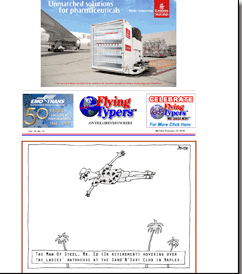
The
predicted pre-Chinese New Year upsurge in air freight
demand in January and early February failed to materialize,
leaving carriers facing a bleak first quarter, with
many Western retailers’ inventories reported to
still be well-stocked.
“It
simply didn’t happen,” said one Hong Kong-based
forwarder. “Exports from China, Korea, and Taiwan
were slow, and we’re not now expecting any upturn
until at least the end of March and perhaps longer.”
This
view was supported by a range of disappointing purchasing
manager index figures for new export orders—Indonesia,
China, Malaysia, and Taiwan have all reporting contracting
orders in recent weeks.
“It used
to be that activity spiked in the month leading up to
China’s New Year: workers rushed to get orders
filled before taking off for a long holiday,”
said a note from HSBC. “No longer. Things turned
even soggier in January, with little sign of a bounce
any time soon. China continues to move sideways, while
Korea and Taiwan slipped again.”
As reported in FlyingTypers, analysts at Drewry had forecast
a demand and rates rebound in January after the Drewry
East-West Airfreight Price Index recorded its steepest
monthly fall in December. However, the Index—a
weighted average of all-in airfreight “buy rates”
paid by forwarders to airlines for standard deferred
airport-to-airport airfreight services on 21 major East-West
routes—instead dropped further in January, down
7.4 points to 83, its lowest level since the Index was
first launched in May 2012.
Last month’s drop
in pricing on major lanes represented the third consecutive
month of falling pricing, during which the index declined
16.7 points from its October peak. Indeed, compared
to the same month last year the Index is now a startling
16.4 points lower.“
Rates were expected to
strengthen on the back of tighter capacity conditions
in the run up to an early Lunar New Year, but the anticipated
peak did not materialize,” said Drewry. “The
fact that the index has hit an all-time record low further
reinforces the perilously weak state of the market.”
Despite the earlier start
to CNY in 2016 compared to 2015, Cathay Pacific saw
just a 0.3 percent year-on-year increase in cargo uplifted
in January, despite a 2.4 percent increase in offered
capacity and surge in shipments towards the end of month.“
We saw a falloff in airfreight
demand after the end-of-year peak and we reduced the
number of freighter services operated accordingly,”
said Mark Sutch, Cathay Pacific General Manager Cargo
Sales & Marketing.
Sutch said demand on the
key transpacific routes had been solid, and Cathay continued
to see strong cargo traffic to and from India, but added,
“rate-cutting as a result of overcapacity continued
to put significant pressure on cargo yield.”
 Frank
Naeve, Lufthansa Cargo Vice President Asia-Pacific,
said the carrier had seen a peak ahead of Chinese New
Year but recovery had been slow since. “It is
too early to make a serious prognosis on how the whole
year will pan out,” he added. “Whilst it’s
true that the overall macroeconomic indicators are not
all positive, Lufthansa Cargo still sees opportunities
to expand our presence in Asia in 2016, including China.There
is no doubt that we are facing challenging market environments.
However, the picture is a differentiated one and as
such we have to remain flexible in order to take advantage
of dynamic market changes.” Frank
Naeve, Lufthansa Cargo Vice President Asia-Pacific,
said the carrier had seen a peak ahead of Chinese New
Year but recovery had been slow since. “It is
too early to make a serious prognosis on how the whole
year will pan out,” he added. “Whilst it’s
true that the overall macroeconomic indicators are not
all positive, Lufthansa Cargo still sees opportunities
to expand our presence in Asia in 2016, including China.There
is no doubt that we are facing challenging market environments.
However, the picture is a differentiated one and as
such we have to remain flexible in order to take advantage
of dynamic market changes.”
Drewry expects airfreight
rates to remain weak until demand picks up in the Northern
Hemisphere as European and North American retailers
rebuild inventories for the new spring season.
Yet analysis by Hackett
Associates suggests Drewry’s forecasts could again
prove overly optimistic. The consultant’s Global
Trade Pulse concluded that U.S. imports were unlikely
to see much growth over the coming months and exports
were also trending down due to the strength of the Greenback.
In Europe imports had also been in decline and the export
pulse “flat.”
The collapse of global
stock markets, according to Ben Hackett, was pushing
global consumers to save rather than spend. “What
we are seeing is a fundamental change in the way that
the global economy reacts to political and financial
instability,” he said. “Gone are the days
of heady consumerism, replaced by a more cautious approach
to spending and a distrust of institutions.”
Worryingly, Hackett warned
the transport industry to “forget about strong
growth.”
Sky
King
|





